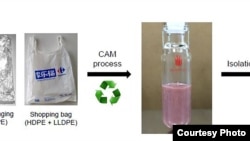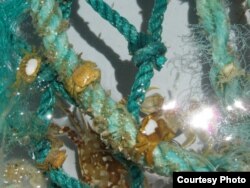Here's a riddle for science-savvy readers: What is one thing you will almost always see, no matter where you look? It's in your home, at work, by the side of the road, at the beach, even in the sky.
Give up? Polyethylene (or PE), the most common form of plastic, is everywhere in the modern world: the containers we store things in, the bottles we drink water out of, the plastic bags that we choose over paper ... it's all polyethylene.
It's convenient, cheap, light and strong, but it's also stubborn stuff, and can stick around from 500 to 1,000 years, and that's why you see it everywhere.
The problem with plastic
And that's the problem, David Constable from the American Chemical Society, told VOA.
"Most is not recycled and its ultimate fate depends on where you are in the world," Constable says. For instance, "there is an enormous swirl of plastic refuse in the Pacific Ocean. There are plastic microbeads distributed throughout the marine environment."
A stunning 8 trillion microbeads a day, according to research from Oregon State University. And while the beads themselves aren't dangerous, they soak up toxic waste and contaminants that end up in marine wildlife and fish, and from there they move right up the foodchain to us.
The other problem is that it's hard to recycle plastic, much harder than it is to recycle paper or glass or metals such as aluminum.
Here's why: Before any plastic can be recycled, it has to go through a complicated and in some cases costly sorting process.
That's because there are different kinds of plastics.
Take a look at the little triangle and number imprinted somewhere on your plastic bottle, bag or container. That number tells you what kind of plastic it is, and there are seven different numbers.
Before any recycling can begin, plastics must be separated by number. Constable calls it a "robust sorting process" requiring "relatively pure plastic."
What is pure plastic? According to Constable, it's plastic that is "not contaminated with food wastes, not blends of plastic, etc."
In modern food packaging, for example, he explains there are somewhere around 20 layers between the air and the food. "These complex plastic laminates are very difficult to recycle or break down into their component parts."
And in many cases, even recycled plastic ends up in landfills because of "chemical contamination."
Break it down
But now the good news: researchers may have found a way to get rid of all this waste cheaply and easily, and break it down into liquid fuel and wax.
The new research was reported Friday in Science Advances and is part of a four-year research project by scientists from the University of Shanghai and the University of California, Irvine.
One of the project leaders, Zheng Huang, says they took a known process, called catalytic cross alkane metathesis (CAM), that uses carbon and hydrogen-based molecules called alkanes to scramble the hydrocarbons that make up polyethylene and ultimately break it down.
"After many cycles of CAM with light alkanes," Zheng says, "PE will be eventually converted to short hydrocarbons suitable for transportation oils."
He told VOA the fuel can be used in diesel engines, and the light alkanes that are used to break down the PE "are very cheap and widely available."
And the best part, Zheng says, is "our catalysts can tolerate various additives in the [plastics]. That is amazing to us." The additives he mentioned are all that dye, resin and various other added stuff in the plastic.
But, he also says the process isn't ready for prime time quite yet.
For one thing, Zheng says, after all those CAM cycles, there isn't much fuel or wax left to extract.
The output "is not high enough for large-quantity plastic-waste recycling," he says. But, "we believe with a more efficient and lower cost catalyst system, this technology will find application in degradation of PE plastic wastes in large scale."
That's what he and his team are working on now. They're also working to see if this process can break down other kinds of plastics.
It's a technology the planet needs, because the demand for plastic — in robotics, 3-D printing and everyday use — is rising, and according to a report from Grand View Research, will continue to grow at least until 2020.







